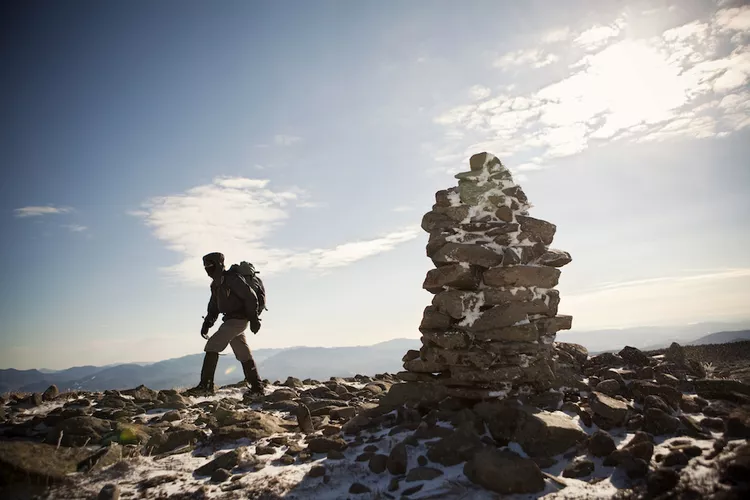Summary
Everyone knows that autumn is a beautiful time to be in New Hampshire, but winter can be an amazing season in the Granite State too. Fresh snow and colder temperatures will send most people scurrying indoors to wait for spring, leaving most of the hiking trails all-but deserted. However, for those who can’t stand the idea of being cooped up all winter long, this is the perfect time to grab a warm jacket, put on some extra layers, and slip into a good pair of boots for a nice walk in the snow.
If you’re wondering which trails you should explore this winter, here are our picks for the five best winter hikes in New Hampshire.
01. Mount Moosilauke (Benton)
New Hampshire is home to 48 mountains taller than 4000-feet, and all of them are open throughout the winter. One of the best is the 4803-foot Mount Moosilauke, which on a clear day offers stunning views of the surrounding countryside all the way to Vermont. Take the lesser-traveled Glenncliff Trail to the summit, and you’ll climb above the treeline along the way. Covering 7.8 miles, with a 3300-feet elevation gain, this is a moderate to challenging hike in any season, so be sure to bring plenty of food and water to keep you sustained on the trail. If the winds aren’t too severe, plan to enjoy some time at the summit, as the view from the top is simply unbeatable.
02. Lincoln Woods Trail (Lincoln)

Stretching 2.7 miles in length and running along a mostly flat route, the Lincoln Woods Trail is an ideal path for cross-country skiers, snowshoers, and winter trail runners. Moreover, it makes for a great hike for those who want to avoid significant elevation changes while still enjoying the beauty of winter outdoor activities. The trail follows along the banks of the picturesque Pemigewasset River, offering plenty of wonderful scenery. This loop route is well marked and easy to follow, featuring a fun suspension bridge to cross. However, remember that the bridges can be slick during winter, so take care as you navigate across.
03. Diana’s Baths (North Conway)

Located inside the White Mountain National Forest, Diana’s Baths is a series of cascading waterfalls and pools that are extremely popular during the summer months. However, in winter, fewer hikers venture on the trail, leaving it relatively quiet and pristine. The trek to the Baths isn’t particularly long, at just over a half-mile on mostly flat ground, making it an accessible winter hike for nearly everyone. The colder temperatures cause the waterfalls to freeze, dramatically enhancing the landscape for much of the winter. The frozen falls glimmer in the sunlight, creating a breathtaking sight.
04. West Rattlesnake Mountain (Holderness)

Don’t let the name mislead you; West Rattlesnake Mountain isn’t among the taller peaks in New Hampshire, making it a suitable choice for a vigorous winter hike. In fact, this “mountain” is around 1260 feet high, with a 2-mile trail leading to the summit and about 450 feet of vertical gain. Therefore, hikers are rewarded with a beautiful view of Squam Lake, which typically freezes early in the winter and is blanketed in fresh snow throughout the season. Although generally considered an easy to moderate walk, snow conditions may pose additional challenges. However, experienced hikers often find no issues along the way, making this an enjoyable winter experience.
05. Cannon Mountain (Franconia)

As another one of New Hampshire’s 4000-foot peaks, Cannon Mountain is among the more accessible mountains during winter. Tailored more for experienced hikers, Cannon features numerous trails crisscrossing its slopes, offering a bounty of options for avid trekkers. One of the highlights is the Kinsman Ridge Trail, a 7.5-mile out-and-back trek that ascends to the 4100-foot summit, providing breathtaking views along the path. It’s important to be warned; this trek can be challenging, and winter hikers should be well-prepared with the appropriate gear. Dress warmly, carry additional layers, inform someone of your plans before setting off, and bring extra food and water. While it is not especially hazardous, it is always wise to err on the side of caution when hiking Cannon Mountain in the winter.





